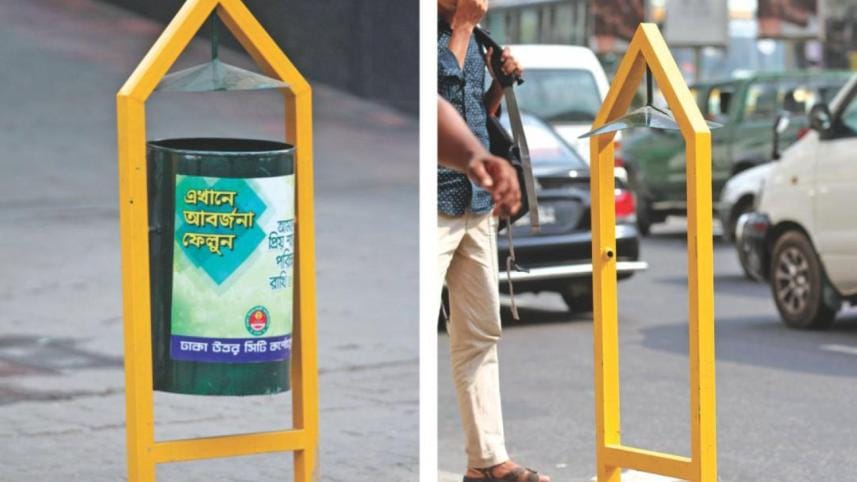Running out of landfills

As we urbanise at record speed, urban waste is being generated in massive quantities. The problem of course is that the two landfills serving the capital have nearly reached their limit. The two areas at Matuali and Aminbazar are nearly full and the city corporations are dreading that there will be no new areas to expand to. Unfortunately, much of the blame lies with policymakers on having no clear-cut rules or regulations on how to treat waste, be it kitchen, construction or industrial waste. Indeed it is estimated that Dhaka alone produces around 3,500 tonnes of waste, the idea till date for municipal corporations had simply been to dispose of it in designated landfills.
Waste disposal is a problem in urban centres all around the world. According to the World Economic Forum, "Cities are evolving faster than ever and encountering unprecedented demographic, environmental, economic and social challenges. Sustainable urban development is the current global priority; however, most cities lack the capacity and resources to ensure that the city develops in a sustainable manner. Multi stakeholder cooperation is essential to fill this gap and build transformation strategies to better shape urbanisation outcomes and lead cities towards growth, well-being and prosperity for all."
As per government data, Dhaka South City Corporation (DSCC) alone dumped about 10 lakh tonnes of waste last year which filled up seven acres of its landfill, whereas Dhaka North's (DNCC) Aminbazar landfill is absorbing about 6,000 tonnes of waste. With economic development and changes in lifestyle, our waste generation rose by a staggering 21.96 percent in 2017-18 compared to the previous fiscal in DNCC. We are told that currently, 70 percent of our waste is organic, but that trend is set to change with economic development, growth of the capital city's population and increased construction of shopping malls, shops, restaurants, etc. Environmentalists warn that as the landfills reach full capacity, city residents will face increasing water and air pollution due to dangers of spill-over.
The problem with urban waste is the lack of proper management, i.e. it is not segregated. Hence converting waste into energy by turning it into biogas or recycling waste isn't happening. Now why is that? Authorities say that there is no dearth of interest from local and international organisations. The proposals centre on a whole range of recycling options that would see construction waste, plastic and glass recycling plants but of course all this will require additional land. And here it gets interesting because the land ministry has not moved on a proposal sent five years ago to expand Matuali Landfill by a further 81 acres and these plants could have been set up on plots in the expanded area.
But long before that, it must be a prerogative for city authorities to educate city residents on waste. It is necessary to sort the waste at source; special emphasis needs to go into how residents can sort electronic and non-electronic garbage. This of course goes far beyond the introduction of coloured bins. The problem can be highlighted from the experience of the Bangladesh Climate Change Trust Fund that expended Tk 2.1 million to give residential buildings in various parts of the city waste bins in four different colours (green, yellow, red and blue) a few years ago. The idea was that cleaners working in these buildings would divide up the waste in four categories: organic, inorganic, hazardous and mixed and put them into the four different bins allotted. That project didn't go far because cleaners didn't feel the need to see it through and therein lay the problem. Unless people in general are made aware of the hazards posed by e-waste, particularly the health hazards that affect them directly, innovative initiatives like this one will end in failure.
In fact, the half-hearted efforts of city authorities over the years have all failed. Back in 2016, the two city corporations installed over 5,000 waste bins all across the city without bothering to sensitise residents about their purpose. People did not bother to throw their garbage in these bins and within a year, the bins had physically disappeared and we can still see the iron fixtures on city roads minus the bins. According to a report in one English daily on April 22, "two waste-based power station projects initiated by DNCC and DSCC never took off due to fund crunch. Shortly after winning the bid to build both plants, Italy-based Management Environment Finance SRL Ltd failed to provide the funds. As per the deal, construction should have begun within 130 days of the agreement. The company could not start the projects even though the deadline expired on June 28, 2013, LGD and city corporations' officials said." So what we are left with is that there is little prioritisation on the issue of waste management and now with little movement on expanding the existing landfills in the city, precisely how we will deal with the menace and health hazards is open to question.
Syed Mansur Hashim is Assistant Editor, The Daily Star.




 For all latest news, follow The Daily Star's Google News channel.
For all latest news, follow The Daily Star's Google News channel.
Comments